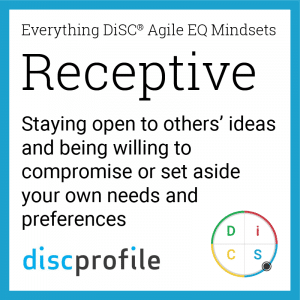Do you have the receptive mindset in Everything DiSC® Agile EQ™? Receptive is one of the eight Agile EQ mindsets and tends to align with S styles. This article will help you understand what it means to have receptive as one of your EQ mindsets, including its benefits and limitations. Everyone has tendencies that come more naturally to them, but everyone also has the ability to stretch into those that take a bit more effort and practice.
If the receptive mindset is not one that comes naturally to you, and you are looking to get more comfortable employing it, see How to be more receptive.
“I make people feel heard.”
Receptive people find value in other people’s ideas even when they conflict with their own. They excel at really considering the thoughts of others—not just letting them speak and then moving on. They don’t get locked into one vision but remain open to changing their approach as they gather new information and perspectives.
Isn’t it exciting to see things in a way you’ve never considered before? Why wouldn’t you want to take advantage of the expertise everyone brings? Receptive people value compromise and curiosity and tend to accommodate others’ needs. They are generally patient, flexible, and courteous, letting others share before speaking up.

It’s hard to overstate the benefits of being a good listener, something that comes more easily to receptive folks than others. A receptive inclination also allows you to:
- draw upon the knowledge and insight of colleagues
- arrive at stronger solutions because you’ve included multiple perspectives
- foster a harmonious environment respectful of everyone’s opinions
- act in a diplomatic way
- maintain an open mind
- set aside your own needs for the good of the group or another person
- build trust
- make room for compromise
- discover different approaches and gain critical info
Which needs drive the receptive mindset?
The mindsets you call upon most often are driven by the needs of your personality, in this case:
- stability
- harmonious relationships
- acceptance and approval from others
- avoiding blame, criticism, or mistakes
- freedom from pressure
If these are your needs, showing up with a receptive attitude can encourage a friendly atmosphere without the tension that can be so uncomfortable for you. And while promoting your own ideas involves the risk of being wrong, letting other people’s ideas take center stage takes pressure off you. Further, listening to and supporting others can garner their acceptance and approval.
Limitations of the receptive mindset
Every inclination has its benefits and limitations. That’s why it is so important to adjust your approach based on the situation at hand. If you find yourself overusing the receptive mindset, you may:
- give up too readily on yourself and your ideas
- sacrifice your needs, which leads to resentment
- start to see other people’s preferences as more important than your own, or become too trusting of their judgment
- support watered-down compromises or mediocre ideas to avoid hurting others’ feelings
- not have your opinions heard
Growing your emotional agility
Your Agile EQ mindsets are your comfort zone. They’re the lenses through which you view the various interactions throughout your day. And they influence the responses you automatically reach for. The first step toward growing your emotional intelligence is understanding the attitudes you find most comfortable. The next is to learn about the other mindsets and how they could help you or hold you back, depending on the situation. Then, with this knowledge, you can act to become agile, taking steps to be more comfortable in all eight EQ mindsets and learning to read situations and respond accordingly.
Taking the Everything DiSC Agile EQ assessment is a great way to start building your EQ. In addition, you can connect with a leadership or life coach—someone to help you articulate your goals and hold you accountable for reaching them. Your Agile EQ profile is a tool you can use with your coach or mentor, or even with a friend who serves as your “accountability buddy.” The profile gives you a common language to ground your discussions and a positive, practical approach to becoming a more emotionally agile person.
See also: How to be more receptive

